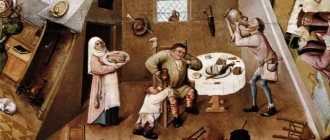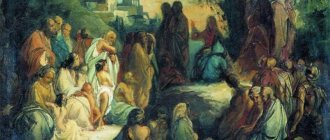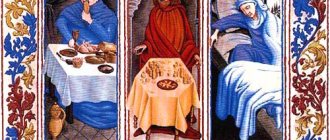Modern life is full of temptations; everywhere a person is told that his desires are the law, and he himself is the highest value. Everything is wrong in the worldview of Orthodox believers. According to him, man is only a creation of the Creator, called to serve Him and not indulge the bad sides of his character. The basis and guidance in their lives are the 10 commandments of God, which are given in order to avoid the 7 deadly sins.
About the author About the book
How did the 10 commandments come about?
1300 years before the birth of Jesus Christ, the prophet Moses, at the command of God, led the Israelites out of Egyptian slavery. God promised to lead his people to a place where contentment and happiness would reign - the Promised Land (promised, from the word “vow” - promise) Palestine. But before that, they had to renounce the slave mentality and corrupt life. And live according to the rules that the Lord Himself established - later known as the 10 commandments of God.
God showed many miracles to the Israelites to deliver them from Egyptian slavery. He sent ten plagues on Egypt: the water in the Nile turned to blood, toads and dog flies multiplied terribly, animals died, the bodies of the Egyptians were covered with abscesses, hail destroyed the harvest, darkness fell on Egypt within three days, all the Egyptian firstborns died. When the Egyptian army pursued the Israelites, God made the Red Sea dry land, and the people of Israel passed through unhindered, but the army perished in the waters of the sea.
Moses received the 10 commandments of God while communicating with the Lord on Mount Sinai. They were carved on two stone tablets by God Himself. But when the prophet Moses came down from the mountain, he saw that his people were dancing around the golden calf - an idol, forgetting about God and their duty to Him. In anger, Moses broke the tablets. God ordered to carve new tablets with inscribed commandments to replace those destroyed.
Prophet Moses receives the 10 commandments (fragment of an Orthodox icon)
Nine Beatitudes of the New Testament
(Gospel according to Matthew 5:2–12)
To complement the 10 Old Testament commandments, Christ taught the 9 Beatitudes in the Sermon on the Mount. In them the Lord outlined a pattern of life characteristic of His followers, Christians. Without canceling what was prescribed by the Old Testament, the Savior expands and elevates the meaning of the ancient commandments, instilling in people the desire for ideal perfection and outlining the path to this perfection.
The Beatitudes are a declaration of Christian moral values. It contains everything necessary for a person to enter the true fullness of life. All the Beatitudes speak of the rewards that those who are faithful to Christ will receive in the Kingdom of the next century: those who mourn will be comforted, those who hunger for righteousness will be satisfied, the meek will inherit the earth, the pure in heart will see God. But already now, by fulfilling the commandments of Christ, a person receives consolation and joy on the eve of the fullness of existence - the advent of the Kingdom of God.
And He opened His mouth and taught them, saying:
- Blessed are the poor in spirit, for theirs is the Kingdom of Heaven.
- Blessed are those who mourn, for they will be comforted.
- Blessed are the meek, for they will inherit the earth.
- Blessed are those who hunger and thirst for righteousness, for they will be satisfied.
- Blessed are the merciful, for they will receive mercy.
- Blessed are the pure in heart, for they will see God.
- Blessed are the peacemakers, for they will be called sons of God.
- Blessed are those who are persecuted for the sake of righteousness, for theirs is the Kingdom of Heaven.
- Blessed are you when they revile you and persecute you and slander you in every way unjustly because of Me.
- Rejoice and be glad, for great is your reward in heaven (...).
The Ten Commandments were given to the Old Testament tribes to keep wild and rude people from evil. The Beatitudes were given to Christians to show what spiritual dispositions they should have in order to draw closer and closer to God and achieve holiness. Holiness, born of closeness to God, is the highest bliss that a person can desire. The Old Testament Law is the law of strict truth, and the New Testament Law is the law of Divine love and grace. They do not contradict, but complement each other.
The content of all the commandments of both the Old and New Testaments can be summarized in the two commandments of love given by Christ: “Thou shalt love the Lord thy God with all thy heart, and with all thy soul, and with all thy mind. The second is similar to it - love your neighbor as yourself. There is no other greater commandment than these.” (Matthew 22:37-40, Mark 12:29-31). And the Lord also gave us faithful guidance on how to act: “Whatever you want people to do to you, do so to them, for this is the law and the prophets” (Matthew 7:12).
***
Let none of us think: we go to God’s church, we pray, making many bows, and for this we will receive the Kingdom of Heaven. No; the one who keeps the commandments of God will receive it. Venerable Theodore of Sanaksar
They often say: in order to be a Christian, you must fulfill the commandments of Christ. Certainly; however, the commandments of Christ are not orders that He gives us: they say, we must live this way, we must live that way, and if you do not live this way, you will be punished for it... No, the commandments of Christ are His attempt to figuratively show us how we could would be, if you become and be a real, worthy person. Therefore, the commandment of Christ is not a command, but a revelation before our eyes about what we are called to be and can be; what we, therefore, should be. Metropolitan Anthony of Sourozh, “Being a Christian”
If it is difficult to be a Christian, it is not because the Lord’s commandments are difficult, but only because the power of sin, the hereditary corruption of soul and body, is great. Professor V.I. Instance
***
“God in His Commandments commands us to do something and not do something else, not because He “just wants to.” Everything that God commanded us to do is beneficial to us, and everything that God forbade us to do is harmful. Even an ordinary person who loves his child teaches him: “drink carrot juice - it’s healthy, don’t eat a lot of sweets - it’s harmful.” But the child doesn’t like carrot juice, and he doesn’t understand why eating a lot of candy is harmful: after all, candy is sweet, but carrot juice is not. That's why he resists his father's word, pushes away the glass of juice and throws a tantrum, demanding more sweets. Likewise, we, adult “children,” strive more for what gives us pleasure and reject what does not suit our whims. And by rejecting the Word of the Heavenly Father, we commit sin.” Archpriest Alexander Torik, “Churching.”
Why do 80% of baptized people answer the question about what commandments there are, without saying a word: “Thou shalt not kill, thou shalt not steal”? Why are they called the sixth and eighth commandments of the Old Testament? Not the first, not the third, not the tenth?.. I thought about this for a long time and came to an interesting conclusion: out of all the commandments, a person chooses those for which he does not have to do anything . “I didn’t kill, I didn’t steal - I’m a great guy, and leave me alone!” Do you know the seventh commandment, “Thou shalt not commit adultery,” why they skip it? Yes, a very “inconvenient” commandment in our dissolute times. So man deceives himself, choosing from the law of God only what is convenient for him, and consciously or unconsciously trampling on what prevents him from living in his own way. Lawyers say that ignorance of the law does not excuse one from responsibility. This is also true in relation to spiritual life, and precisely because knowledge (or ignorance) of the law depends entirely on us, on our good or bad will. ...By breaking the commandments, a person does not even insult God. God is holy and cannot be mocked. But a person cripples his own life and the lives of his loved ones, because the commandments are not some kind of shackles: life is already difficult, and then some other commandments must be kept! No, it's not like that. The commandments of God are precisely the conditions for a normal, fulfilling, healthy and joyful life for every person. And if a person violates these commandments, he harms, first of all, himself and his loved ones. priest Dimitry Shishkin
***
Metropolitan Hierotheos (Vlahos)
From the Sermon on the Mount, and above all from the Beatitudes, it follows that a person must cleanse himself of passions, cleanse his heart of all thoughts that dwell in it, and acquire humility of spirit in order to become worthy of seeing God. The word of Christ is clear:
Blessed are the poor in spirit, for theirs is the Kingdom of Heaven. Blessed are those who mourn, for they will be comforted. Blessed are the meek, for they will inherit the earth. Blessed are those who hunger and thirst for righteousness, for they will be satisfied. Blessed are the merciful, for they will receive mercy. Blessed are the pure in heart, for they will see God... (Matthew 5:3-8).
The Beatitudes show the spiritual path of man, the path of deification, the path that leads to healing. Consciousness of one's spiritual poverty , that is, awareness of the passions that have taken possession of the heart, leads a person to repentance and blessed sorrow . To the extent of the depth of this sorrow, Divine consolation comes to his soul. It is on this path that a person gains humility and inner Living in spiritual humility, he thirsts even more for God's justification and strives By keeping God's commandments, he is honored with the knowledge God's mercy and purifies his heart even more. is to purify the soul . Some of them relate to the purification of the rational, others to the purification of the irritable nature of the soul. And when the soul is cleansed of passions, a person achieves the contemplation of God.
The Beatitudes reveal the essence of spiritual life and the way to heal a person. A person who keeps the commandments is sealed with the seal of the Holy Spirit and becomes a member of the Body of Christ, a temple of the All-Holy Spirit.
***
EAT. Vereshchagin
At the time of Jesus, according to tradition, there were 613 prohibitions and injunctions, but by the same time a tradition had developed of reducing them to a much smaller number.
Thus, the psalmist king David reduced all the commandments to just eleven (Ps. 14:1-5):
God! who can dwell in Your habitation? who can dwell on Your holy mountain? He who walks uprightly and does righteousness and speaks the truth in his heart; who does not slander with his tongue, does not do evil to his sincere and does not accept reproach against his neighbor; he in whose eyes the outcast is despised, but who glorifies those who fear the Lord; who swears, even to an evil person, and does not change; who does not give his silver at interest and does not accept gifts against the innocent. He who does this will never be shaken.
The Prophet Isaiah further reduced the number of commandments and brought it to six (Is. 33:15-16): He who walks in righteousness and speaks the truth; He who despises self-interest from oppression, keeps his hands from taking bribes, stops his ears so as not to hear about bloodshed, closes his eyes so as not to see evil; he will dwell on the heights...
The Prophet Micah (Micah 6:8) limited himself to only three commandments: O man! It has been told to you what is good and what the Lord requires of you: to act justly, to love mercy and to walk humbly with your God.
The Prophet Isaiah elsewhere (Is. 56:1) mentions two commandments: Thus says the Lord: maintain judgment and do righteousness...
Finally, the prophet Amos (Amos 5:4) summarized all the commandments to one: For thus says the Lord to the house of Israel: Seek Me, and you will live.
Text of the 10 Commandments of God
1. I am the Lord your God, who brought you out of the land of Egypt, out of the house of slavery; Let you have no other gods before Me.
2. Do not make for yourself an idol or any image of anything that is in the sky above, or that is on the earth below, or that is in the water below the earth.
3. Do not take the name of the Lord your God in vain, for the Lord will not leave without punishment the one who takes His name in vain.
4. Work six days and do all your work; and the seventh day is the Sabbath of the Lord your God.
5. Honor your father and your mother, so that your days on earth may be long.
6. Don't kill.
7. Do not commit adultery.
8. Don't steal.
9. Do not bear false witness against your neighbor.
10. Thou shalt not covet thy neighbor's house; You shall not covet your neighbor's wife; neither his manservant, nor his maidservant, nor his ox, nor his donkey, nor anything that is your neighbor's. (Ex. 20, 2-17).
Time as a victim
Remembering the Sabbath means, in addition to the above, valuing the time we have. We can give it to God and people. We are all rich in time, but even so, God does not require great sacrifices from us, offering to devote only one day to Him. But a strange person is ready to go or go anywhere in the cold and rain to satisfy his needs - and cannot overcome himself to take care of his soul. God doesn't need our money, He waits for our gratitude. And we don’t even find two hours to come to the temple, thank Him for everything, cleanse our souls from the wounds that we inflicted on ourselves in six days. When taking care of the body, we must remember that our body is attached to our soul, and it is the soul that is the main thing we have. And the soul is renewed in the church. Therefore, let us observe the fourth commandment, it is very important for everyone who wants to remain human.
Archpriest Alexander Frantovsky
First commandment
God points to Himself as the one true God and forbids giving divine honor to anyone else. God created man, gave him life, and after death calls him to his heavenly chambers. This commandment took first place for the reason that only God, and no one else, should be the main value of a person’s life.
Sins against the first commandment:
– atheism (denial of the existence of God);
– polytheism (veneration of various deities instead of one God);
– heresy and schism (incorrect and perverted interpretation of true religion);
– despair (when a person ceases to hope for help and salvation from God);
– witchcraft (appeal to demonic forces);
– superstition (supernatural origin and meaning are attributed to ordinary situations and events).
Basics of Orthodoxy: why you should fulfill the commandments
God gave the 10 biblical commandments or Decalogue to the Jewish people during their journey from slavery to the land given by the Lord - Canaan.
Initially, the Lord Himself inscribed them on two tablets, but later they were rewritten by the hand of Moses.
The law can be divided into two parts:
- the first 4 commandments are about man’s relationship with the Lord;
- the last 5 are about the relationship between a person and his neighbors.
God's law is difficult for people with a sinful nature to obey. However, this is something that we urgently need to strive for. What is it for?
Just as the force of attraction, gravity, etc. operate, spiritual laws exist and operate. Violation of them leads to the threat of carnal and spiritual death.
People are not outraged by the existence of gravity, and they know that if you jump from a height, you can fall to your death. The same goes for prolonged immersion in water or falling into fire. Why does keeping the Lord's law cause so much outrage?
Atheists live as if the spiritual world does not exist, but this does not exempt them from the application of spiritual rules. If a person does not believe in the power of gravity, this does not mean that it does not exist and that violating it will lead to death. The same applies to the Decalogue - violation will lead first to spiritual death, and then to carnal death.
Many people view the Decalogue as a set of rules for going to heaven after death. But this is wrong, since the goal is to prove to a person that he cannot cope on his own and needs God’s help and Jesus Christ. No one can do this thoroughly on their own, but only with God's help. We all need the death of Jesus Christ and divine forgiveness with atonement. One should ask the Lord for help in fulfilling the law and pray in repentance if it has been broken.
Important! The 10 biblical commandments are necessary for anyone who considers himself a true Christian to know, because according to them he can check his life path and compare it with the one that the Lord has prepared.
Moses with the commandments given to him
Second Commandment
God forbids the veneration of idols and idols (any objects, creatures and phenomena of the surrounding world: the sun, moon, stars, animals, plants), as pagans do, and deification of them.
It is worth noting that icons and the saints depicted on them are not idols. Orthodox Christians respect icons as depictions of the image of God, the Mother of God and saints. We pray not to a material object, a board with a picture, but to the one who is depicted on it. Saints are people who set us an example of how we can preach and profess love for the Creator and our neighbors throughout our lives.
Sins against the second commandment:
– man’s deification of his creations and worship of them as a deity (for example: an artist worships his painting as the highest of creations);
– worship of wealth and raising money to a level above God;
– veneration of the icon as a material object.
God and neighbor
Sunday should be dedicated to God and neighbor. You can, after praying and taking communion, spend time with your family, call your parents or friends. You can sit down with your family and discuss issues that you didn’t have time to resolve on weekdays. Deal with them together, come to a common denominator - and it will be easier to move on through life.
The question may arise why you need to devote Sunday not to yourself, but to your neighbors. The fact is that for an Orthodox person this is very important. This is why we pray and receive communion, in order to love our neighbor. The fourth commandment calls us to dedicate the seventh day to God, but St. John Chrysostom writes: whoever loves God and hates his neighbor is a liar. Therefore, we must actively show our love. If we love God, we must serve people. After all, at the Last Judgment they will not ask us anything about the basics of theology; there very simple matters will be significant: did you feed the hungry, clothed the poor, did you call the lonely - after all, sometimes even an ordinary call can greatly support a person. We have all been isolated during quarantine and know how difficult it is to experience restrictions alone. Together it is much easier to overcome problems and troubles.
Christ did not abolish any commandments; He fulfilled the Old Testament law in full, but in addition to this, He brought us the main commandment - the commandment of love. That is why He healed and fed on the Sabbath day, to show people that the main thing is our neighbors, and that is why He said: “Truly I say to you, just as you did it to one of the least of these brothers of Mine, you did it to Me” (Matthew 25: thirty). To fulfill the fourth commandment, it is not necessary to look for someone in need somewhere far away; it can be every person whom God has brought to us at this moment.
Third Commandment
It is forbidden to pronounce the name of God without reverence or between words in conversation. In biblical times, God and the names He bore were inextricably linked. And if the Lord is holy, then His name is holy, which must be treated with reverence and reverence.
Sins against the third commandment:
– frivolous use of an oath in ordinary conversations;
– blasphemy and blasphemy (when they talk about God jokingly and mockingly);
- violation of oaths given to God.
What did we inherit from Adam and Eve?
The fact that humanity has lost Paradise is not so bad. The worst thing is that instead of eternal life, where there was no suffering, no illness, no sorrow, no hunger, no cold, they acquired as an inheritance:
- mortality - sooner or later life will be taken away: from someone in infancy or even from the unborn;
- passion - anger, irritability, the need to eat, dress, conquer space, work hard at work, live indulging in suffering and sins;
- perishability - strength and youth melt away quickly, old age and illness, weakness - the result of our existence.
This is what we inherited from our forefathers. Can the lot of human life be called a victory or a triumph of reason, when for violating the only commandment: “Do not eat the fruit of the tree of the knowledge of good and evil,” you came to such a pitiful state? To return the lost Paradise, choosing the Christian path of life, you will inevitably come to the fight against sin.
Fourth Commandment
God commands that after six days of work, the seventh should be devoted to serving Him. In the Old Testament, the seventh day of the week was celebrated - Saturday, as the day of the end of the creation of the world. In the New Testament, the first day of the week began to be celebrated - Sunday, in memory of the Resurrection of Jesus Christ. Nowadays, a belief has spread among people that it is strictly forbidden to work on holidays and Sundays. Clarification is required: service to God cannot be replaced by work these days.
Sins against the fourth commandment:
– disrespect for Sundays and holidays, failure to attend Sunday services;
- violation of fasts.
How to spend the seventh day?
The commandments themselves do not save, the Lord saves. They are like flags that we shouldn’t cross. These are spiritual frameworks that hold us back, these are tips that help us walk the path of life with dignity and receive salvation.
Of course, we do not always manage not to work on the seventh day. If a person works for someone else, there is nothing wrong with that. For example, if on Sunday you go and clean the house of a sick person, work hard for him - this will not be a violation of the commandment. If you devote this day to chopping wood and don’t go to church and don’t pray, that is, you deliberately treat this day with disdain, then this, of course, is a sin.
Fifth Commandment
God obliges us to honor parents, take care of them, and for this he promises caring children a long life. In the Old Testament, honoring parents was so important that anyone who slandered (condemned) father and mother was sentenced to death.
Sins against the fifth commandment:
– beating the father or mother;
– disobedience to parents (except for cases where the actions and demands of parents contradict the Holy Scriptures);
– indifference to parents, reproaches and evil words towards them;
– neglect of parental blessing;
– leaving prayer for parents.
Particularly serious sins
These are the ones that destroy both the soul and the body. Or those about whom it is said that they cry out to God for vengeance. Accept them not as a dogmatic statement, but as an experience. It is difficult to wash away from such violations of God’s Law without incurring punishment in the form of suffering.
If the scoundrel prospers (enduring illness and sorrow cleanses the soul), then the Lord is still waiting and suffering, since the posthumous fate of such people is very terrible. They gain full measure, deserving hellish retribution. The most serious sins include:
- Killing or humiliating (bullying) parents.
- Fornication, adultery, corruption, seducing others.
- Withholding the worker's legal wages.
But through repentance, penance, and deeds that atone for guilt, everything can be corrected while a person is alive. As Zacchaeus did, he promised that he would reward those deceived four times more than he took.
Sixth Commandment
God forbids murder. You cannot take the lives of people and yourself. Only God gives life and takes it away. The exception is war, where a person has to kill in defense of his homeland, his loved ones, and children.
Sins against the sixth commandment:
– murder;
– committing an abortion and pushing for it;
– suicide;
- temptation to sin your neighbor;
– incitement to murder and incitement to suicide;
– leaving a neighbor without help in a situation of mortal danger.
What are passions and how to overcome them
In fact, the frequently encountered concept of “7 (8) deadly sins” is the main passions that enslaved a person. They are derivatives of all other sins. For example:
- Love of money: being thrifty and thrifty is normal. If, like Kashchei, you languish over gold, dream of wealth, envy, use unrighteous methods for excessive accumulation, excess, it means becoming a slave to passion. These include: disbelief in God, fear of old age, hard-heartedness towards the poor, greed, lack of mercy, theft, deception, etc.
- Gluttony is the mother of such sins: drunkenness, drug addiction, voluptuousness, gluttony, selfishness, intolerance, breaking fasts, etc.
- Despondency and depression are the plague of the modern world. In the United States, there are about 20 million people suffering from this disease. It ranks first, ahead of cardiovascular and oncological diseases. These include the following sins: neglect of duties, petrified insensitivity to matters of salvation, despair, driving oneself to suicide.
Major vices can be curbed if a person controls them. When he is unable to control himself, to say “no,” he is a slave to sin. You can have passions, but not act on them. This state is called dispassion; ascetics and saints of God strive for it. Saints achieve this, but none of them will say about themselves that they are sinless.
How to overcome passions?
It is wrong to believe that dispassion is the lot of monks and hermits. The commandments are given to all people. Whether they are in the world or have renounced it. To win, one must fight not only against sins, but against their derivative, that is, against the “parent”. Having defeated him, the “children” themselves will disappear. What weapon to use:
- Repentance.
- Participle.
- Fasting and prayer.
- Opposite virtues.
For example, non-covetousness, generosity, alms are opposite to the love of money. There is no clear distinction between passions. Having nurtured one, over time you will attract the other. Gluttony will give birth to fornication, fornication will lead to the love of money, etc. To get the fastest result, you need to start with the most outstanding, inherent in your nature.
Note: When you are rich in all 8 passions, the main evil is pride, vanity . They are opposed by love and humility . If you can acquire these virtues, consider that you have conquered sins and become saints.
Seventh Commandment
God forbids spouses to cheat on each other, and for unmarried people to enter into illegal cohabitation - to commit fornication. Adultery and fornication begin not from the moment of physical intimacy, but much earlier, when a person allows himself to dream about something lustful, to look at someone else’s husband or wife with lust.
Sins against the seventh commandment:
– treason;
– reading books and watching films of an erotic nature;
– temptation;
– handjob;
– fornication;
– marital jealousy;
– divorce without good reason;
– avoidance of marital intimacy as a reason for the second spouse to seek physical intimacy on the side.
Why is a person given an inquisitive mind?
Only a person with intelligence asks questions and seeks answers.
A wise person will find meaning in life, know why he was born, who God is, why he should believe in Him, fulfill the commandments, and fight sins. It is not difficult to make sure that the world was created by the Logos - this is an indisputable fact (you can verify it from personal experience), since opposing theories do not stand up to the criticism of believing pundits. The monkey won’t think; for some reason he doesn’t need it. We are given an inquisitive mind. By whom? Of course, by the One in whose Image the first man was created. We are the descendants and heirs not only of external similarity (we walk upright, have arms, legs, we speak), but also of spiritual, and even damage to the soul acquired by it. We are a “computer” whose memory contains not only progressive, but also “viral” programs.










